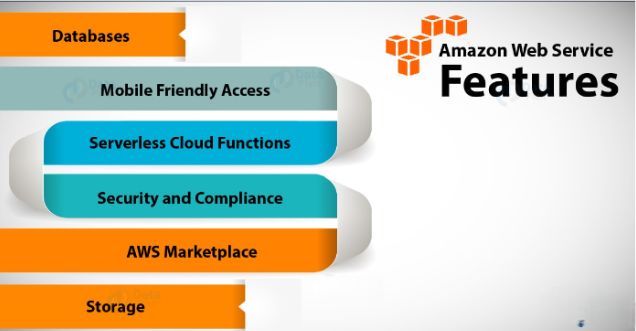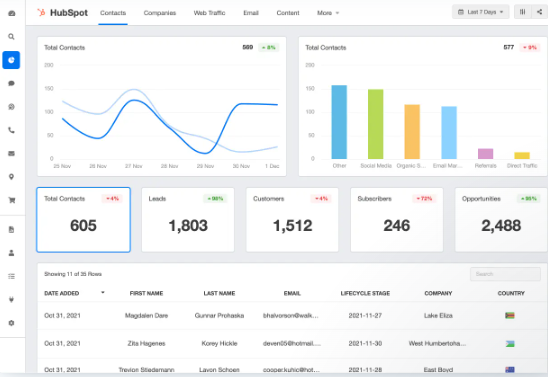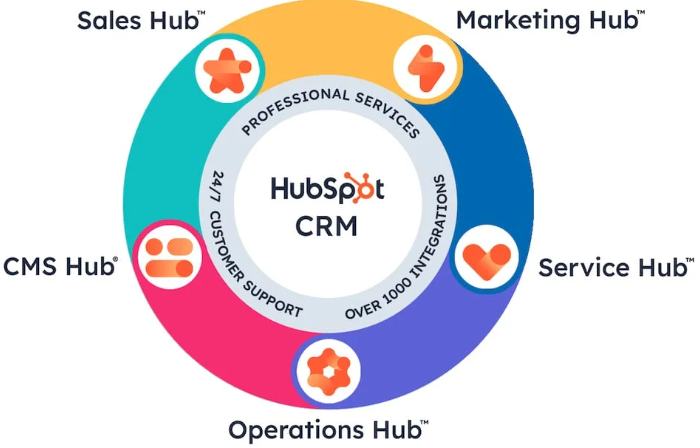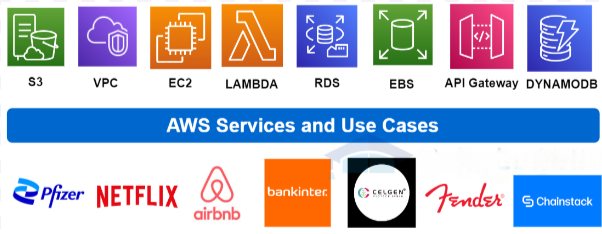Introduction
In the rapidly evolving landscape of digital marketing and technology, understanding the differences between AWS services vs HubSpot is crucial for businesses aiming to thrive in 2024. Both platforms offer unique features and benefits that cater to different needs within content creation, marketing, and customer engagement. This blog post will delve into the strengths and weaknesses of AWS services vs HubSpot, helping you determine which solution aligns best with your business goals. Whether you’re a startup seeking scalable cloud solutions or a marketing team looking for a comprehensive CRM platform, this comparison will provide valuable insights to guide your decision-making process.


Table of Contents
Understanding AWS Services
In the evolving landscape of cloud computing, AWS services stand out as powerful tools that can elevate your business operations. As organizations seek efficient, scalable, and reliable solutions, understanding AWS becomes crucial. This post will provide a clear overview of AWS services, their key features, and how they can benefit your business.

What is AWS?
Amazon Web Services (AWS) is a comprehensive cloud computing platform offered by Amazon. Launched in 2006, AWS provides a wide range of services that allow businesses to host applications, store data, and leverage advanced technologies—all while maintaining flexibility and cost-effectiveness.
Key Features of AWS
1. Scalability
One of the standout features of AWS is its scalability. Businesses can easily scale their resources up or down based on demand. Whether you’re launching a new product or experiencing seasonal spikes, AWS adjusts to your needs, ensuring optimal performance without overspending.
2. Cost-Effectiveness
AWS operates on a pay-as-you-go pricing model. This means you only pay for what you use, allowing for better budget management. This flexibility is particularly beneficial for startups and small businesses that need to keep costs in check while scaling their operations.
3. Security
AWS prioritizes security, offering a robust framework to protect your data and applications. With features like encryption, identity management, and compliance certifications, businesses can trust AWS to keep their information secure.
4. Global Reach
With data centers around the globe, AWS provides low latency and high availability for users worldwide. This global infrastructure enables businesses to serve customers efficiently, regardless of their geographical location.
Core AWS Services

1. Compute Services
Amazon EC2 (Elastic Compute Cloud): This service allows businesses to rent virtual servers to run applications. EC2 is highly customizable and supports various operating systems, making it suitable for a wide range of applications.
2. Storage Solutions
Amazon S3 (Simple Storage Service): S3 offers scalable object storage for data backups, media files, and more. It’s easy to use, secure, and integrates seamlessly with other AWS services, making it an ideal solution for storing large amounts of data.
3. Database Management
Amazon RDS (Relational Database Service): RDS simplifies the process of setting up and managing relational databases. It supports various database engines, including MySQL, PostgreSQL, and SQL Server, allowing businesses to choose the one that best fits their needs.
4. Networking and Content Delivery
Amazon CloudFront: This content delivery network (CDN) speeds up the delivery of your website or application content. By caching data at edge locations around the world, CloudFront reduces latency and improves user experience.
5. Serverless Computing
AWS Lambda: This service allows you to run code without provisioning or managing servers. With Lambda, you can execute functions in response to events, enabling you to build scalable applications quickly and efficiently.
Benefits of Using AWS Services
Flexibility and Agility
AWS services provide businesses with the flexibility to innovate and experiment without significant upfront costs. This agility enables teams to respond rapidly to market changes and customer needs.
Integration with Other Services
AWS offers a wide array of tools that can integrate seamlessly with one another. This interconnectedness allows businesses to create comprehensive solutions tailored to their specific requirements.
Continuous Innovation
Amazon consistently updates and expands its AWS offerings. By choosing AWS, businesses can take advantage of the latest technologies and features, ensuring they stay competitive in their respective industries.
Understanding HubSpot
In the world of digital marketing and sales, HubSpot has established itself as a leading platform designed to help businesses streamline their processes and improve customer engagement. This overview will provide key insights into HubSpot’s features, benefits, and how it stands out, especially when compared to other solutions like AWS services.

What is HubSpot?
HubSpot is an all-in-one inbound marketing, sales, and customer service software platform. Launched in 2006, it was built on the idea of attracting customers through valuable content and personalized experiences. Today, HubSpot offers a suite of tools that empower businesses to attract visitors, convert leads, and delight customers.
Key Features of HubSpot
1. Comprehensive Marketing Tools
HubSpot’s Marketing Hub includes tools for email marketing, social media management, SEO optimization, and content creation. These features enable businesses to execute effective marketing campaigns from a single platform.
2. User-Friendly Interface
One of HubSpot’s biggest advantages is its intuitive interface. Designed for ease of use, even non-technical users can navigate the platform effectively. This accessibility allows teams to focus on strategy rather than getting bogged down by complicated software.
3. CRM Integration
HubSpot’s built-in Customer Relationship Management (CRM) system centralizes customer information, interactions, and analytics. This integration streamlines the sales process and helps teams nurture leads more effectively.
4. Automation Capabilities
With HubSpot, businesses can automate various marketing and sales tasks. This includes email workflows, social media posting, and lead scoring, which saves time and enhances efficiency.
5. Analytics and Reporting
HubSpot provides robust analytics and reporting features that allow businesses to track the performance of their marketing campaigns. Detailed insights help teams make data-driven decisions and optimize their strategies.
Core HubSpot Tools
1. Marketing Hub
The Marketing Hub is designed to attract and engage visitors. It includes tools for creating landing pages, managing email campaigns, and optimizing content for search engines, making it a powerful tool for inbound marketing.
2. Sales Hub
HubSpot’s Sales Hub focuses on enhancing the sales process. It includes features for tracking deals, managing pipelines, and automating follow-ups, enabling sales teams to close deals more efficiently.
3. Service Hub
The Service Hub is aimed at improving customer support. It offers tools for ticketing, customer feedback, and knowledge base management, allowing businesses to enhance customer satisfaction and retention.
4. CMS Hub
The CMS Hub allows users to create and manage website content easily. With built-in SEO recommendations and a user-friendly editor, businesses can optimize their online presence without needing extensive technical skills.

Benefits of Using HubSpot
Streamlined Operations
By consolidating marketing, sales, and customer service tools into one platform, HubSpot helps businesses streamline their operations. This reduces the complexity of managing multiple tools and enhances collaboration across teams.
Improved Customer Engagement
HubSpot’s focus on inbound marketing ensures that businesses can engage customers meaningfully. By providing valuable content and personalized experiences, companies can build stronger relationships with their audience.
Enhanced Reporting
With comprehensive analytics, HubSpot allows businesses to measure the effectiveness of their campaigns in real-time. This insight enables teams to adjust strategies quickly to maximize results.
Continuous Updates
HubSpot consistently enhances its platform with new features and updates. This commitment to innovation helps businesses stay competitive and leverage the latest tools and technologies.
AWS Services vs HubSpot: Key Comparisons
1. Target Audience
AWS: Primarily caters to developers, IT professionals, and businesses looking for scalable cloud solutions. Ideal for companies with technical resources to leverage AWS’s extensive capabilities.
HubSpot: Focuses on marketing and sales teams, making it suitable for businesses aiming to improve customer engagement and inbound marketing strategies without heavy technical resources.
2. Pricing Structure
AWS: Uses a pay-as-you-go model, which can be cost-effective for businesses with fluctuating needs. However, it can become expensive if not managed properly, especially for users unfamiliar with cloud pricing.
HubSpot: Offers tiered pricing plans, including a free version with limited features. The paid plans can be more predictable for budgeting purposes but may add up depending on the number of users and features needed.
3. Ease of Use
AWS: Has a steeper learning curve, requiring technical expertise to set up and manage services. Suitable for businesses with dedicated IT teams.
HubSpot: Known for its intuitive interface, making it accessible for non-technical users. Teams can quickly learn and utilize its features effectively.
4. Features and Functionalities
AWS: Offers a vast range of services, allowing businesses to customize their cloud infrastructure. Ideal for complex projects requiring specific technological solutions.
HubSpot: Provides an integrated suite of marketing tools, enabling businesses to manage their inbound marketing efforts efficiently. Great for holistic marketing strategies that encompass various channels.
5. Customer Support
AWS: Provides various support plans, but response times and assistance may vary based on the plan chosen. Technical documentation and community forums are also available for help.
HubSpot: Offers robust customer support with resources like tutorials, forums, and a responsive helpdesk. The support experience is generally well-regarded among users.
Use Cases: When to Choose AWS Services
Startups and Developers
For startups needing scalable resources, AWS offers flexibility and a wide range of services that can adapt as the business grows. Developers can leverage AWS to build and deploy applications with minimal upfront costs.
Data-Heavy Applications
Businesses that handle significant amounts of data or require advanced analytics can benefit from AWS’s comprehensive data services, including storage and computing power.
E-Commerce Platforms
E-commerce businesses can utilize AWS to host websites, manage inventories, and process transactions securely while ensuring high availability and low latency.

Use Cases: When to Choose HubSpot
Small to Medium-Sized Businesses
HubSpot is particularly effective for small to medium-sized businesses looking to establish or enhance their inbound marketing strategies without extensive technical expertise.
Marketing Teams
For marketing teams focused on lead generation, content marketing, and customer engagement, HubSpot’s integrated tools provide an efficient way to manage campaigns and track performance.
Customer-Centric Organizations
Companies prioritizing customer service and experience will find HubSpot’s CRM and support tools invaluable for building strong customer relationships and improving satisfaction.

Conclusion: Making the Right Choice
When deciding between AWS services and HubSpot, consider your business’s specific needs, budget, and technical capabilities. AWS is best for those seeking customizable cloud solutions with extensive technical support. In contrast, HubSpot offers a user-friendly platform for businesses looking to enhance their marketing and customer engagement efforts without diving deep into technical complexities.
In conclusion, both AWS and HubSpot have unique advantages and can be incredibly powerful tools when used in the right context. Analyze your goals and resources, and make an informed decision that aligns with your business objectives.
With this knowledge, you can confidently choose the right platform to enhance your content creation and marketing strategies, ultimately driving success in your business.
By carefully analyzing AWS services vs HubSpot and understanding the specific use cases, you’ll be better equipped to select the right tool for your content marketing needs. Whether you go for AWS’s extensive capabilities or HubSpot’s user-friendly features, the choice will have a lasting impact on your business.





